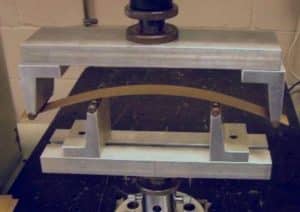ASTM D6272
Standard Test Method for Flexural Properties of Unreinforced and Reinforced Plastics and Electrical Insulating Materials by Four-Point Bending
ASTM D6272 tests the flexural properties of unreinforced and reinforced plastics and electrical insulating materials by four point bending. The test consists of a bar of rectangular cross section resting on two supports that is loaded by means of a loading nose between the supports. Micom offers ASTM D6272 Testing as part of its Plastics testing material testing services.
ASTM D6272 Testing Use and Factors To Be Considered
ASTM D6272 is used to characterize rigid and semi-rigid plastics in flexion which is an important characteristic for these materials. As such, it is used for quality control and specification purposes. Stiffer materials should instead be tested to ASTM D790 which is a 3-point loading test method instead of a 4-point loading for ASTM D6272.
As mentioned by ASTM International , the difference between a four point bending and a three point bending is that “in four point bending the maximum axial fiber stress is uniformly distributed between the loading noses. In three point bending the maximum axial fiber stress is located immediately under the loading nose.”
Four Point Bending Typical Experimental Parameters
- Number of specimens/product: Typically 5. However, in some cases, the tensile properties need to be measured both in the machine and perpendicular to the machine direction as they can vary substantially from one orientation to the other. This behavior is called anisotropy.
- Distance between supports (span): A support span-to-depth ratio of 16:1 is typically used
- Specimen dimensions: varies as a function of material type and thickness
- Conditioning and testing Temperature: 23 ± 2 °C
- Conditioning and testing relative humidity: 50 ± 5%
Other Related Test Methods
The ASTM D790 test, which is used for stiffer materials, is related to the ASTM D6272 test. If you would like to explore other related test methods, we invite you to view our Plastics Testing and Material Testing resources.
If you have any questions about the ASTM D6272 test, or other plastics and polymer tests, we invite you to contact us today. It will be our pleasure to talk about plastics testing and discuss your custom testing requirements.


